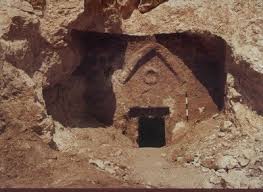Outside Sources on the Supposed Jesus Family Tomb and Ossuary
 • Hollywood Hype: The Oscars and Jesus’ Family Tomb, what do they share?
• Hollywood Hype: The Oscars and Jesus’ Family Tomb, what do they share?
Blog post of Biblical scholar Darrell Bock. Stay up-to-date at his blog’s homepage: blogs.bible.org/bock.
• “No need to yell, only a challenge for some who need to step up and could”
Blog post of Biblical scholar Darrell Bock.
• “The Jesus Tomb? Titanic Talpiot tomb theory sunk from the start”
Blog post of Biblical scholar Ben Witherington. Stay up-to-date at his blog’s homepage: benwitherington.blogspot.com..
• Christian Newswire: Ten reasons why the Jesus tomb claim is bogus.
• Remains of the Day: Scholars dismiss filmmakers’ assertions that Jesus and his family were buried in Jerusalem.
• The Jesus Family Tomb? From respected scholarly apologetics site, Leadership University.
Probe Articles on Christ’s Resurrection, Biblical Archaeology and the Bible
• Cruci-Fiction and Resuscitation by Russ Wise
If Jesus’ remains do inhabit a tomb anywhere, that demands an explanation of what really happened after his crucifiction. In 1997, a paid advertisement in a campus newspaper declaring Christ’s resurrection a hoax was deeply disturbing to its readers. This essay raises nine problems with the ad and answers them, and addresses one aspect of the current debate in so doing.
• Evidence of Jesus’ Existence? by Rusty Wright
An ancient bone receptacle (ossuary) from Israel announced in 2002 contains the inscription, “James, son of Joseph, brother of Jesus.” It could be the earliest extra-biblical archaeological evidence of Jesus. This article notes the speculative nature of determining the authenticity of such finds, even with the best of evidence. Yet, time after time, archeology attests to what even a Jewish expert describes as the “almost incredibly accurate historical memory of the Bible.”
• Jesus’ Resurrection: Fact or Fiction? by Rusty Wright
Resurrection evidences made clear and simple.
• Archaeology and the New Testament by Pat Zukeran
Numerous people, places and events described in the New Testament have been verified by archeology. Helpful section on Understanding Archaeology.
• Archaeology and the Old Testament by Pat Zukeran
Apologist Zukeran surveys the importance of archaeology with regard to its confirmation of biblical history. Includes sections entitled Historical Confirmation of Jesus, Accuracy of the Gospels, Confirmation Regarding the Crucifixion and more.
• Authority of the Bible by Pat Zukeran
Why take biblical accounts seriously in light of discoveries like the supposed tomb of Jesus’ family? This article explores why the Bible is the Word of God by examining Internal evidence (self-proclamation, the Holy Spirit, transforming ability, and unity) and External evidence (indestructibility, archeology, prophecy).
• “How Do We Know Christ Rose from the Dead? And Who Wrote the Bible?” by Jimmy Williams
Almost half of Probe’s nearly 1300 Web resources are responses to actual questions from visitors like you. This one answers the question, “How Do We Know Christ Rose from the Dead?” and “Who Wrote the Bible?”
© 2007 Probe Ministries